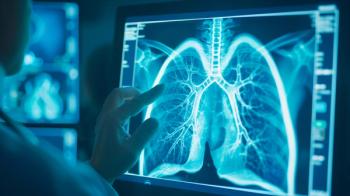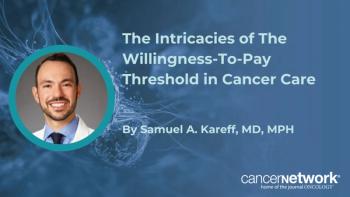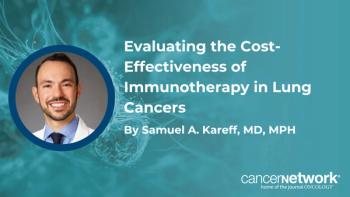
Oncology NEWS International
- Oncology NEWS International Vol 14 No 1
- Volume 14
- Issue 1
Cetuximab Active as Monotherapy for Recurrent NSCLC
This supplement to Oncology News International includes 17 reportson clinical trials of targeted therapies used alone, in combination with chemotherapy,or in combination with each other in the treatment of non–small-cell lung cancer (NSCLC),bronchoalveolar carcinoma, glioblastoma multiforme, and renal cell carcinoma.Included is a report on a novel targeted agent recently approved for treatment of NSCLC.
BOSTON-Early data froma phase II trial show that cetuximab(Erbitux) is active as monotherapy forrecurrent non-small-cell lung cancer(NSCLC). The planned interim analysis,presented by Thomas J. Lynch,MD, of Massachusetts General Hospital,Boston, also revealed that theactivity is not related to any previouslyidentified mutations in the epithelialgrowth factor receptor (EGFR) (abstract7084).The phase II trial was undertakenbecause the addition of cetuximab tochemotherapy produced promisingresults in doublet and triplet combi-nations, but single-agent activity inNSCLC had not been established. Thetrial enrolled patients with stage IIIB/IV NSCLC who have recurrent or metastaticdisease following one or moreprior regimens, including prior platinum-based therapy. The original protocolallowed tumors to be either EGFRpositive or negative but was amendedto EGFR-positive only due to slowaccrual of EGFR-negative patients. Thetrial has now closed to enrollment witha total of 61 EGFR-positive patientsand 6 EGFR-negative patients.Investigators administered aninitial cetuximab dose of 400 mg/m2on day 1 of cycle 1, followed by fourweekly doses of 250 mg/m2 of cetuximab.Each cycle is defined as 4 weeks.Treatment in the ongoing study continuesuntil disease progression orunacceptable toxicity develops.Most patients had stage IV disease,and mean age was 64 years (range 40-78). The mean number of cycles thathad been received by the interim analysiswas three, with a range of one tosix. One patient each had grade 3 or 4rash, cellulitis, fatigue, or nausea andvomiting, and these adverse eventswere considered to be possibly relatedto cetuximab.Drug Is ActiveThe interim analysis of the first 33EGFR-positive patients identified twopatients (6%) with confirmed partialresponses and seven patients (21%)with stable disease. "This shows thatthe drug is active but doesn't tell youany more than that," Dr. Lynch commented.He noted, however, thatstable disease does confer a survivaladvantage.Interestingly, he reported that althoughresponse to gefitinib (Iresssa)correlates with some mutations in theEGFR, analysis of responders vs nonrespondersamong patients in thisstudy did not reveal a similar relationshipwith cetuximab."In the sample size analyzed,"Dr. Lynch told Oncology NewsInternational, "previously characterizedEGFR mutations do not seemto have an effect on response tocetuximab."
Articles in this issue
about 21 years ago
Efforts Continue to Uncover Early Indicators of Clinical Effectabout 21 years ago
Avastin/FOLFOX4 Improves Overall Survival in Pts With Advanced Colon Caabout 21 years ago
Study Supports Need for RT Post-Lumpectomy in Most Ptsabout 21 years ago
BMS-354825 Overcomes Imatinib Resistance in CMLabout 21 years ago
High pCR Rate With Neoadjuvant Chemo-RT in Rectal Caabout 21 years ago
Kepivance Approved for Oral Mucositis in Hematologic CaNewsletter
Stay up to date on recent advances in the multidisciplinary approach to cancer.
Related Content




Evaluating the Cost-Effectiveness of Immunotherapy in Lung Cancers
















































